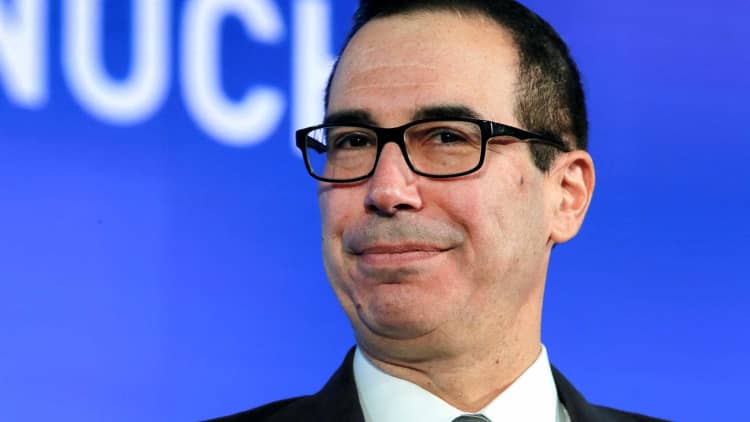Beyond the blur of daily events, an unexpected shift is slowly coming into focus: the struggles of all-Republican governance have handed Democrats growing leverage over how policy gets shaped.
Eroding Republican strength has long since dashed initial hopes for enacting a new health-care plan to replace Obamacare by Easter and a new tax system by August. But four months into Donald Trump's presidency, his party faces growing skepticism that it can resolve major issues, which in turn would force concessions to Democrats in return for votes.
Consider the breadth of GOP problems:
- President Trump and his associates face FBI and congressional investigations into their interactions with Russia. Trump is hiring outside counsel, and aides are preparing a White House "war room" to cope with the storm. Major Republican reforms on issues such as taxes or health care require strong, focused leadership from a Republican president.
- The Congressional Budget Office estimates that the House-passed health bill would leave 23 million fewer people with coverage, and destabilize insurance markets in areas serving 1 in 6 Americans. Just 20 percent of the public supports it, a new Quinnipiac University national poll shows. Senate Republicans are meeting privately to craft a more politically viable approach, but haven't produced one yet.
- The White House has opposed a critical piece of the House GOP tax plan, but neither the White House nor the Senate has produced a plan of its own yet. On Thursday, Trump Cabinet officials Steve Mnuchin and Mick Mulvaney gave contradictory accounts of the administration's intentions. Moreover, congressional rules prohibit Republican majorities from enacting tax reform under the expedited procedures until they complete action on health reform using those same procedures — and pass a new budget.
- Trump's budget proposal, which contains priority shifts that would require Democratic backing in any event, has been declared dead on arrival by fellow Republicans. Internal splits over the extent and targeting of spending cuts threaten their ability to reach consensus not only on the budget, but also on an increase in the federal debt ceiling that the Treasury says it needs within a few months in order to avoid default. The House Freedom Caucus announced Wednesday it will not support an increase until its austerity demands are met, bolstering the likelihood that the White House and GOP leaders will be forced to obtain Democratic support.
- These and other setbacks have diminished Trump's already-low political standing and rattled Republican confidence about holding their House majority in 2018 midterm elections. His approval rating in the Quinnipiac poll was 37 percent; only 28 percent strongly approve of the president, while 49 percent strongly disapprove, foreshadowing a 2018 gap in Republican and Democratic voter enthusiasm. For the same reason, the Democratic candidate in Georgia's special House election next month has a chance to win what the Republican candidate's pollster calls "a close race that shouldn't be."
Those stumbles give House Democratic Leader Nancy Pelosi and her Senate counterpart Charles Schumer greater ability to influence policy in Washington that anyone expected as Trump took office. The principal question is where they can bring that influence to bear.

Steve Bell, a longtime Senate budget aide now at the Bipartisan Policy Center, said the GOP's simultaneous predicament on the debt limit and health care could produce a Senate compromise with Democrats on both. On health care, that would mean legislation closer to Obamacare-repair than Obamacare-replace.
Spokesmen for GOP House and Senate leaders dismissed that possibility as fanciful. But not all Republican lawmakers do.
"A bipartisan health bill is a possible outcome, though no one in leadership wants to admit it," said Rep. Charlie Dent, a Pennsylvania Republican.
The business community has always recognized that the major issues are going to require some level of Democratic buy-in.Kevin Maddenveteran GOP communications aide
GOP splits give Democrats an opening to influence other initiatives, too. Veteran Republican communications aide Kevin Madden, who now advises businesses at Hamilton Place Strategies, said that could mean tax reform that gives more to the middle class and less to the wealthy, and an infrastructure plan relying more on cash outlays and less on tax credits.
"The business community has always recognized that the major issues are going to require some level of Democratic buy-in," Madden said. That expectation, he added, "has become more pronounced."
One indication of heightened pressure on Republicans came with Wednesday night's bizarre incident in the special House election in Montana, where the Democratic candidate has been surprisingly competitive in a GOP-friendly state. Law enforcement authorities charged Republican candidate Greg Gianforte with assaulting a reporter — after the reporter pressed him to comment on the House GOP health bill.
Watch: Dems push back on Trump budget



